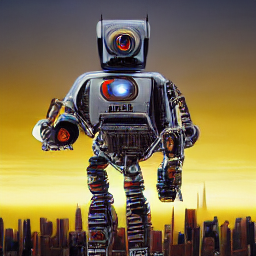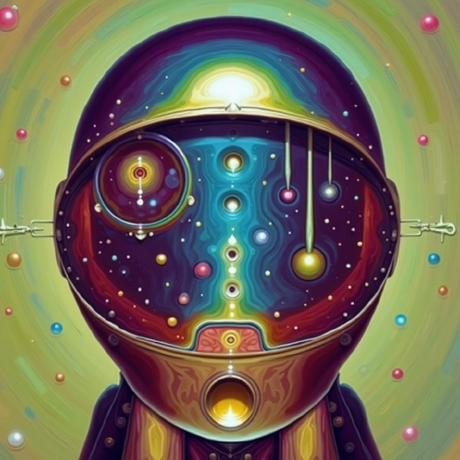Discover and explore top open-source AI tools and projects—updated daily.
VQGAN-CLIP by  nerdyrodent
nerdyrodent
Local VQGAN+CLIP tool for text-to-image generation
Top 17.4% on SourcePulse
This repository provides a local implementation of VQGAN+CLIP, a generative art model that synthesizes images from text prompts. It targets artists, researchers, and hobbyists seeking to run advanced AI image generation without relying on cloud platforms like Google Colab. The primary benefit is enabling local, customizable control over the VQGAN+CLIP pipeline.
How It Works
The project leverages the VQGAN architecture for image encoding and the CLIP model for guiding the generation process based on text descriptions. It combines these components to iteratively refine an image, starting from noise or an initial image, to match the semantic meaning of the provided text prompts. This approach allows for high-fidelity image synthesis guided by natural language.
Quick Start & Requirements
- Install: Create a conda environment (
conda create --name vqgan python=3.9,conda activate vqgan), install PyTorch with CUDA 11.1 (pip install torch==1.9.0+cu111 torchvision==0.10.0+cu111 torchaudio==0.9.0 -f https://download.pytorch.org/whl/torch_stable.html), and then install other dependencies (pip install -r requirements.txt). Clone required repositories:git clone https://github.com/openai/CLIPandgit clone https://github.com/CompVis/taming-transformers. Download VQGAN checkpoints to acheckpoints/directory. - Prerequisites: Python 3.9, Anaconda, NVIDIA GPU with CUDA 11.1. VRAM requirements range from 8GB (380x380) to 24GB (900x900).
- Setup Time: Estimated setup time is approximately 30-60 minutes, depending on download speeds and dependency installation.
- Links: VQGAN+CLIP GitHub, CLIP GitHub, Taming Transformers GitHub.
Highlighted Details
- Supports text-to-image generation with weighted and multiple prompts.
- Enables image-to-image translation and style transfer using an initial image.
- Includes "Story Mode" for sequential prompt generation and zoom video creation.
- Offers advanced options for optimizers, learning rates, and image augmentations.
Maintenance & Community
The project is a personal exploration by "nerdyrodent" and does not indicate a formal maintenance team or community channels like Discord/Slack.
Licensing & Compatibility
The repository itself does not explicitly state a license. However, it depends on CLIP (MIT License) and Taming Transformers (MIT License). VQGAN models are typically released under permissive licenses, allowing for commercial use and integration into closed-source projects.
Limitations & Caveats
AMD GPU support is experimental and requires ROCm installation. CPU-only generation is possible but significantly slower. The project is presented as a personal experiment, implying potential for breaking changes or lack of long-term support. CUDA out-of-memory errors are common for larger resolutions or higher cut counts.
3 years ago
Inactive
Explore Similar Projects
clip-guided-diffusion by  afiaka87
afiaka87
big-sleep by  lucidrains
lucidrains
deep-daze by  lucidrains
lucidrains
IP-Adapter by  tencent-ailab
tencent-ailab
 Shengjia Zhao(Chief Scientist at Meta Superintelligence Lab),
Shengjia Zhao(Chief Scientist at Meta Superintelligence Lab), 
 catcathh
catcathh op7418
op7418 rinongal
rinongal Tencent-Hunyuan
Tencent-Hunyuan VectorSpaceLab
VectorSpaceLab brycedrennan
brycedrennan openai
openai Sygil-Dev
Sygil-Dev